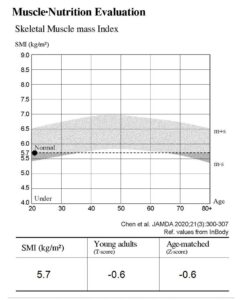Achieving a lean muscular body is a goal for many fitness enthusiasts and athletes. It not only improves physical appearance but also enhances overall health and fitness.
In this blog post, we will explore the importance of strength training in building lean muscle mass, reducing body fat, and using advanced body composition analysis like InBody to track your progress. By following these principles, you’ll be well on your way to a lean, muscular body.

Strength Training: The Key to a Lean Muscular Body
Strength training is crucial for developing a lean muscular body, as it helps increase lean muscle mass, burn calories more efficiently, and improve overall health and fitness. Incorporating strength training into your fitness routine not only enhances physical appearance but also provides a myriad of health benefits, such as injury prevention and better posture.
Here are some essential tips highlighting the importance of strength training in building muscle:
- Compound exercises: Focus on compound exercises, like squats, deadlifts, bench presses, and rows, which target multiple muscle groups simultaneously. These exercises help build muscle mass, improve functional strength, and stimulate greater hormonal responses for muscle growth.
- Progressive overload: Gradually increase the weight, sets, repetitions, or rest time between sets to challenge your muscles and promote muscle growth. This principle ensures that your muscles adapt and grow stronger over time.
- Train consistently: Aim to train each muscle group at least twice a week for optimal muscle growth. Consistency in your training routine will lead to better results and help prevent plateaus.
- Mind-muscle connection: Focus on the contraction and control of your muscles during each exercise. Establishing a strong mind-muscle connection can help activate the target muscle group more effectively and lead to better muscle development.
- Adequate recovery: Give your muscles time to recover and grow by scheduling rest days or alternating between muscle groups. Proper recovery is crucial for muscle growth and preventing overtraining.
By incorporating these strength training tips into your fitness routine, you will be well on your way to building a lean, muscular body.

Maintaining a Healthy Metabolism and Nutrition
Once your metabolism is in check, you can manipulate foods to help you lose weight and implement an effective training schedule to add muscle to your body. Building muscle is hard work and requires excellent sports nutrition. Make sure to consume a balanced diet rich in protein, complex carbohydrates, healthy fats, vitamins, and minerals to support muscle growth and recovery.
Here are some nutritional tips for achieving a lean, muscular body:
- Prioritize protein intake: Protein is essential for muscle growth and repair. Aim to consume a source of high-quality protein with every meal, including lean meats, poultry, fish, dairy, legumes, and protein supplements.
- Opt for complex carbohydrates: Complex carbohydrates, such as whole grains, fruits, and vegetables, provide a sustained source of energy and help maintain stable blood sugar levels. These carbs are crucial for fueling your workouts and supporting muscle recovery.
- Incorporate healthy fats: Healthy fats, like those found in avocados, nuts, seeds, and olive oil, play a vital role in hormone production and overall health. Ensure that you consume adequate amounts of healthy fats daily.
Consistency and Monitoring Your Progress
Consistency is crucial when working toward a lean, muscular body. Stick to your strength training routine and maintain a balanced diet to see results over time.

Tracking your progress with tools like the InBody analysis can help you stay motivated and make any necessary adjustments to your training and nutrition plan.
The InBody devices, a body composition analyzer is an advanced tool that provides accurate, quick, and non-invasive assessments of your body composition, including Skeletal Muscle Mass (SMM) and body fat percentage.
We understand that achieving a lean muscular body is a goal for many fitness enthusiasts and athletes. It not only improves physical appearance but also enhances overall health and fitness. That’s why InBody provides age-specific evaluation by InBody Big Data, a comprehensive analysis that considers your age group in order to provide a more personalized and accurate assessment of your body composition.

The InBody 970 provides an age-evaluation graph that focuses on Skeletal Muscle Mass. This allows you to compare your current muscle with the reference range, which helps you determine whether your current muscle mass is adequate compared to the InBody big data.
With this feature, the InBody 970 can provide Skeletal Muscle Index (SMI) and Skeletal Muscle Mass by age, based on globally accumulated InBody Big Data. This allows you to compare your data to the data of the young age group (T-score) and the same age group (Z-score), providing a more detailed understanding of your body composition.
With the ability to compare your data to others within your age group, you can see how you measure up and potentially identify areas for improvement. This feature adds an extra layer of analysis to the InBody 970, making it an even more valuable tool for those looking to achieve a lean muscular body.
Conclusion
Achieving a lean muscular body requires a combination of strength training, proper nutrition, and monitoring your progress using advanced body composition analysis tools like InBody.
By focusing on muscle gain, incorporating effective strength training techniques, maintaining a healthy metabolism and nutrition plan, and tracking your progress consistently, you will be well on your way to a lean, muscular body.
Remember that patience and perseverance are vital, and with time and effort, you will see the results you desire.











